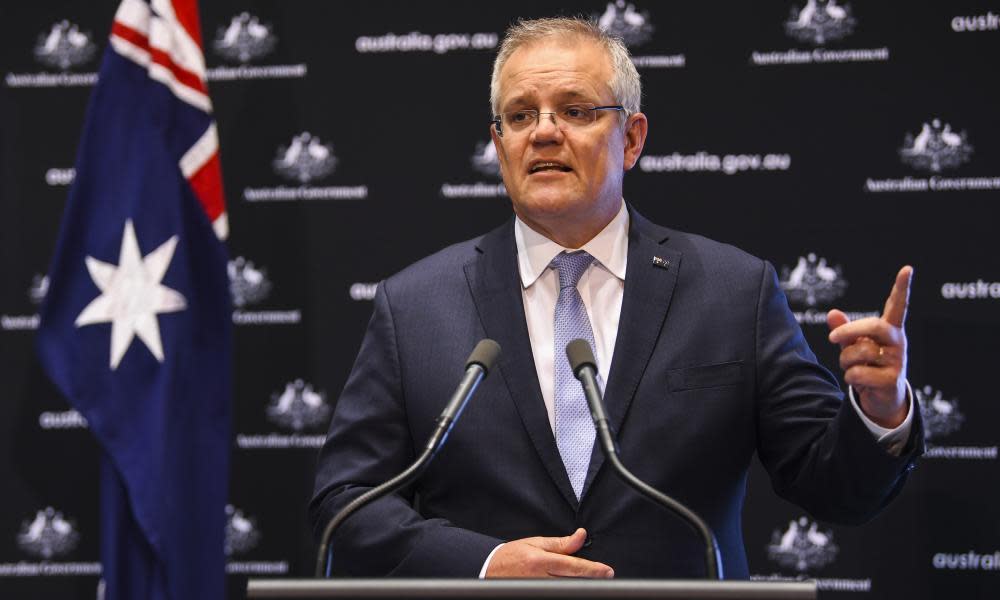'Coag is no more': national cabinet here to stay with focus on post-Covid job creation

Scott Morrison has indicated that cabinet norms of solidarity and secrecy will be applied to future intergovernmental meetings aiming to boost job creation, announcing the Council of Australian Governments “is no more”.
After the latest meeting of the national cabinet on Friday, Morrison said the governing body composed of federal, state and territory leaders will replace Coag by continuing fortnightly teleconference meetings during the Covid-19 pandemic and monthly meetings thereafter.
Morrison also announced a new $131.4bn five-year hospital funding agreement with the states, including an extra $31.4bn for public hospitals and a guarantee no jurisdiction will be left worse off by Covid-19 spending.
Related: 'We've kicked the can down the road': Australian businesses brace for slow recovery
Under the new federal structure, the council of federal financial relations – the treasurers’ meeting – will gain responsibility for all intergovernmental partnership funding agreements.
Morrison claimed the national cabinet “will be driven by a singular agenda, and that is to create jobs” before adding that other issues, including women’s safety, domestic violence, Indigenous affairs and closing the gap, will remain on the national agenda.
National cabinet will be composed of reform committees on seven topics: rural and regional, skills, energy, housing, transport and infrastructure, population and migration, and health.
Morrison announced a “congestion-busting” plan to scrap regular meetings of other ministerial reform and regulatory councils attached to Coag, largely replicating a Tony Abbott era initiative which cut the number from 22 to eight, only to see the list grow again under Coalition federal governments.
Bodies set to be “consolidated and reset” including ministerial forums on tourism, trade, consumer affairs, sport and recreation, the environment, vehicle emissions, the Great Barrier Reef; and regulatory councils on disability, infrastructure, energy, education, health, the Murray-Darling and gene technology.
“Ministers will consider the value of each of those and I suspect we’ll see many of them no longer be required,” Morrison said.
He said bureaucrats and ministers will still talk “because they find value not because of a bureaucratic process”.
Once a year, the national cabinet will meet with the treasurers and the Australian Local Government Association to discuss federation reform.
Related: Coronavirus job losses in Australia mapped by electorate
Morrison argued that “one of the reasons why the national cabinet has worked” is that it operated as a cabinet with “candour and collegiality” and the same rules on “security of documents” as federal cabinet – which will also apply to the seven new committees.
Morrison said the off-the-record get together with state and territory leaders the evening before Coag is “the best conversation you ever have” without the “theatre … that can … restrict the genuine reform discussions”.
Morrison said that state and federal cabinets work in the same way and produce “good decisions that support essential services”, dismissing concerns the moves will decrease transparency in federal relations. “This is just the same process. I mean, it’s not a spectator sport.”
Earlier, the national cabinet was told there are now fewer than 500 active cases of Covid-19 in Australia. With daily infection rates remaining low, many states now have plans to move from stage two to stage three of the three-step plan to easing restrictions.
Morrison told reporters eradication or elimination are not national cabinet policy, however, so the emergence of new cases should not result in governments abandoning the three-stage process.
Regional differences in the implementation of that phased removal of restrictions remain.
On Friday, the South Australian premier, Steven Marshall, boasted that his state had “led the way” in many areas of easing restrictions. From Monday, South Australia will allow up to 80 people in pubs, clubs, and restaurants.
In Victoria, the premier, Daniel Andrews, announced that from Monday the government will no longer prescribe the list of reasons to leave home but employees will still be required to work from home where possible.
Our message is very clear: if you have been working from home - you must keep working from home.
From today, it will become part of the Chief Health Officer's formal direction – and it's up to all of us to make it happen.— Dan Andrews (@DanielAndrewsMP) May 28, 2020
On Friday morning, Josh Frydenberg gave further indications that the federal government will extend the $70bn jobkeeper wage subsidy program or look to provide other support packages to sectors that continue to need help, including tourism and the housing sector.
The Reserve Bank governor, Phil Lowe, has warned that he doesn’t want the government to “withdraw the fiscal stimulus too early.”
Despite repeated warnings that fiscal stimulus is temporary, Morrison rejected claims of a contradiction, labelling it a “false difference” and pointing to government spending such as accelerated infrastructure projects.
Morrison noted there are “many forms of support” other than the jobkeeper package. “And we will target the best measures to do the job that we need it to do and that is to support people, staying in jobs, and getting back into jobs.”
Asked about his reform process for industrial relations, Morrison again refused to guarantee workers would not be worse off and the Better Off Overall Test for workplace pay deals will be retained.
“My concern is if we keep going down the path that we’re going down and have a discussion that is constrained in a whole range of ways based on things that used to be the norms before, then people are going to lose their jobs,” he said. “And they won’t be better off.”

 Yahoo News
Yahoo News 
